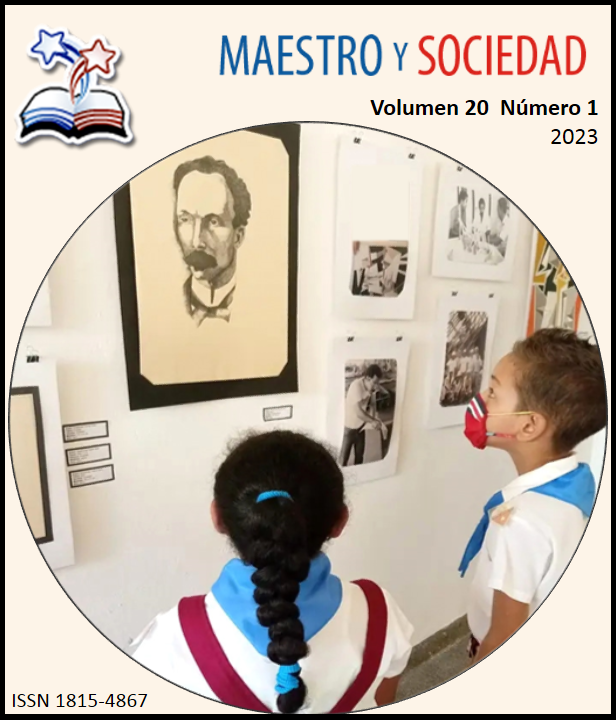Diagnosis of investigative skills as a premise for the development of problem-based learning
Diagnosis of investigative skills as a premise for the development of problem-based learning
Keywords:
problem-based learning; natural Sciences; investigative skillsAbstract
Introduction: The objective of the work was to diagnose investigative skills as a premise for the development of problem-based learning, in the Natural Sciences careers that are part of the Faculty of Applied Sciences, at the Ignacio Agramonte Loynaz University of Camagüey.
Materials and methods: Of the empirical methods, surveys were applied to students and teachers.
Results: It was evidenced that students present difficulties in the search for information in printed and digital texts, taking a personal position on a subject and communicating information orally.
Discussion: In the consulted bibliography, the studies on investigative skills carried out by various authors justify that these constitute a necessity because research is not only one of the substantive processes of the university, but also represents a specific function of professional work, it is also linked to a way of thinking and acting that prepares the graduate to successfully face the demands of scientific-technical development.
Conclusions: It is concluded that the diagnosis demonstrated the need to develop research skills in students, in the same way, teachers must develop a work dynamic that guarantees the development of these skills that allow the processes of analysis, synthesis, comparison and interpretation, the strengthening of skills in writing, searching for information, and drawing conclusions as a premise for the implementation of problem-based learning.
References
Beltrán, M., Aranda, B., Querts, O. & Palacios, A. (2019). El desarrollo de habilidades investigativas en estudiantes de la carrera de Medicina. Maestro y Sociedad, 16 (3), 520-533. Recuperado de https://maestroysociedad.uo.edu.cu/index.php/MyS/article/view/4953
Dueñas, V. H. (2001). El aprendizaje basado en problemas como enfoque pedagógico en la educación en salud. Colombia Médica, 32 (4), 189-196. https://www.redalyc.org/pdf/283/28332407.pdf
Fernández, C. E. & Villavicencio, C. E. (2017). Habilidades investigativas para trabajos de graduación. ACADEMO Revista de Investigación en Ciencias Sociales y Humanidades, 4 (1), 1-12. https://revistacientifica.uamericana.edu.py/index.php/academo/article/view/61
García, J. N., Conde, M., Inciarte, A., Sánchez, E., Marín, F. & García, J. (2019). Revisión de estudios internacionales sobre evaluación y metodologías docentes universitarias. INFAD Revista de Psicología, 1 (2), 273-282. https://www.researchgate.net/publication/335148605_Revision_de_estudios_internacionales_sobre_evaluacion_y_metodologias_docentes_universitarias
García, N. M., Paca, N. K., Arista, S. M., Brisvani, B., Valdez B. B. & Gómez, I. I. (2018). Investigación formativa en el desarrollo de habilidades comunicativas e investigativas. Journal of High Andean Research, 20 (1), 125-136. http://dx.doi.org/10.18271/ria.2018.336
Garzón, F. A. (2017). El aprendizaje basado en problemas. Revista Educación y Desarrollo Social, 11 (1), 8-23. https://revistas.unimilitar.edu.co/index.php/reds/article/view/2897/2530
Luy, C. (2019). El Aprendizaje Basado en Problemas (ABP) en el desarrollo de la inteligencia emocional de estudiantes universitarios. Propósitos y Representaciones, 7(2), 353-383. http://www.scielo.org.pe/scielo.php?pid=S2307-79992019000200014&script=sci_arttext
Meza, S. N., Zárate, N. E. & Rodríguez, C. L. (2019). Impacto del aprendizaje basado en problemas en estudiantes de salud humana. Educación Médica Superior, 33 (4), 37-47. http://ems.sld.cu/index.php/ems/article/view/1588/897
Restrepo, B. (2005). Aprendizaje basado en problemas (ABP): una innovación didáctica para la enseñanza universitaria. Pedagogía universitaria, 8, 9-19. https://www.redalyc.org/articulo.oa?id=83400803
Rodríguez, T. N., Rodríguez, A. & García, M. (2016). La investigación y su contribución formativa en estudiantes de las ciencias médicas. EDUMECENTRO, 8 (1), 143-158. https://scielo.sld.cu/scielo.php?script=sci_arttext&pid=s2077-28742016000100011&lng=es&tlng=es
Rosario, Y. & Ferrer, E. A. (2014). Estrategia para la formación de competencias investigativas en estudiantes de la carrera Ingeniería Informática. Didasc@lia: Didáctica y Educación, V(4), 143-162. https://dialnet.unirioja.es/servlet/articulo?codigo=6579053
Sepulveda, P., Cabezas, M., García, J. & Fonseca, F. (2019). Aprendizaje basado en problemas: percepción del proceso enseñanza aprendizaje de las ciencias preclínicas por estudiantes de Kinesiología. Educ Med, 470, 1-7. https://www.elsevier.es/es-revista-educacion-medica-71-pdf-S1575181319300221
Valdés, J. M. & Páez, M. (2021). Caracterización del estado actual del proceso de enseñanza-aprendizaje del Cálculo I en la carrera de Ingeniería Informática de la Universidad de Pinar del Río Hermanos Saiz Montes de Oca. Revista Mendive, 19 (2), 406-417. http://mendive.upr.edu.cu/index.php/MendiveUPR/article/view/2414
Vidal, P.I., Canós, L., Santandreu, C. & Guijarro, E. (2018). Influencia del estilo de aprendizaje del docente en el aula. Universitat Politècnica de València. https://riunet.upv.es/handle/10251/123074
Zuta, L. (2021). Reflexiones sobre estrategias para fortalecer el pensamiento crítico en los estudiantes. Maestro y Sociedad, 76-84. https://maestroysociedad.uo.edu.cu/index.php/MyS/article/view/5447
Downloads
Published
How to Cite
Issue
Section
License
Copyright (c) 2023 Mercedes Caridad García González, Humberto Silvio Varela de Moya, Lina Aurora Campos Martínez, Renier Mejías Salazar

This work is licensed under a Creative Commons Attribution-NonCommercial-NoDerivatives 4.0 International License.
This journal provides immediate open access to its content, based on the principle that offering the public free access to research helps a greater global exchange of knowledge. Each author is responsible for the content of each of their articles.



























 Universidad de Oriente
Universidad de Oriente 